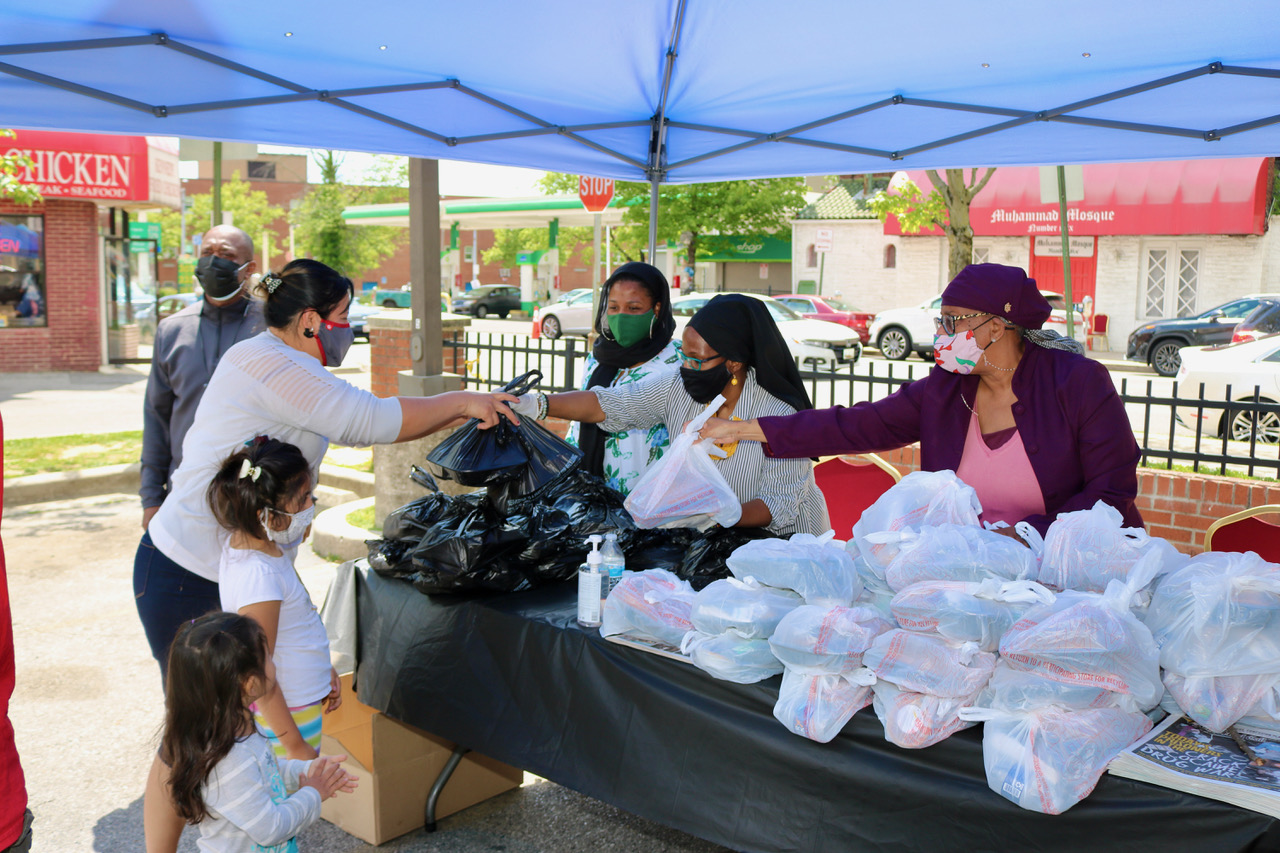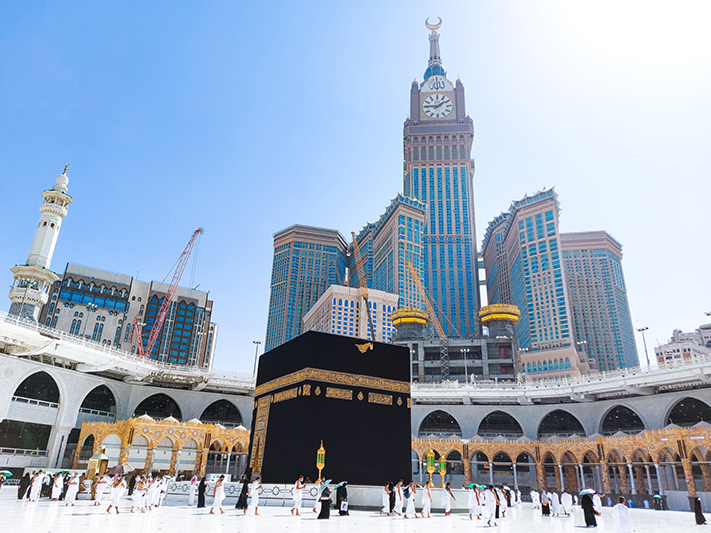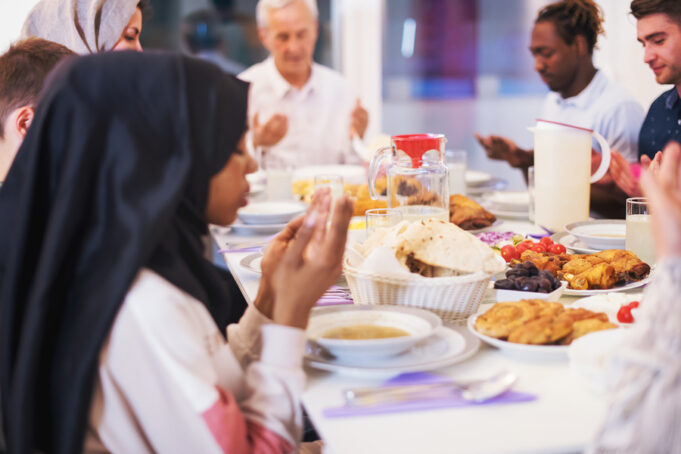For 1.8 billion Muslims worldwide, the sighting of the “Shawwal Moon” on May 12 brought on the end of the Ramadan fast and the beginning of Eid al-Fitr celebrations. For the second year Muslims fasted under the stress and strain of the Covid-19 pandemic. For many, the prayers and fasting completed represented a significant tradeoff; Muslims from around the globe handed their stress over to Allah (God), and He handed peace over to the Faithful.
Ramadan is the Islamic month-long fast where believers refrain from food, drink, and sexual relations with their spouse from dawn until sunset. It is one of the five pillars of Islam and a time for serious spiritual reflection, prayers, and charity.
Muslims in the U.S. and abroad took creative approaches handing out grab and go iftar meals, limiting gatherings to family, increasing outdoor activities, and spacing in prayer. Socially-distanced Eid celebrations were also in abundance.
According to the Associated Press, in the country with the largest Muslim population, Indonesia, worshippers wore masks as they joined in communal prayers, but in some areas considered at high risk for transmission of the coronavirus, mosques—including Southeast Asia’s largest, the Istiqlal Grand Mosque in the capital Jakarta—closed their doors as a precaution.

In America, especially within the Black Muslim community, the precautions were wide and varied, as was the creativity used to meet the fast requirements. Nevertheless, the benefits reported were impressive.
Student Minister Carlos Muhammad from Muhammad Mosque No. 6 in Baltimore told The Final Call, last year really provided a good education moving forward into Ramadan 2021. “Going into our second year of quarantine or conditions due to Covid-19, of course, has affected the ability of us as Muslims during our blessed month of Ramadan, really to congregate as we traditionally would,” he said.
“We have had to become creative, and thanks be to Allah, we used a virtual platform, and we hosted what was called Ramadan Saturday. That was a platform in which we discussed and brought certain presenters on to keep the believers together from around the country.”
“When Ramadan comes, you realize all of your thoughts and deficiencies,” noted Fareed Shakir, owner of Graceline Development Corp., Inc, in McDonough, Ga. Mr. Shakir also agreed that last year thoroughly prepared him for this year’s fast.
Imam Abdul Kashif is with the Muhammad Center in Hartford, Conn., said this year’s festivities including Eid celebrations marking the end of the holy month were challenging yet still fulfilling.
“Normally we have iftars (evening meals) every night, but this year we weren’t able to do that because of the Covid restrictions. So, what we did instead was we made sure that we did programs to feed the poor in our community, as well as the people outside of our community, as well as public giving,” said Mr. Shakir.
Mohammad Sani, a businessman associated with the newly built Kumbe Opeikuma Central Masjid in Ghana, told The Final Call their most significant challenge was the heat.
“We had good leadership coming from the chief imam in Ghana who issued directives against large gatherings. Instead, he proposed small meetings that adhere to Covid-19 protocols.” With great pride, Mr. Sani pointed out the government through the Interior Ministry had declared Thursday, May 13, as a public holiday as Muslims celebrate their annual Eid-ul-Fitr.

Imam Qasim Amin Nathari, a noted author and scholar, told The Final Call, that Allah (God) blessed them with a good and beautiful Ramadan.
“We’re social beings and part of our expression of our tradition is socialization. That’s been our tradition throughout the history of the Nation of Islam and beyond that. So we’re hoping that Allah will allow us whenever we’re able to make a transition back into the Mosque and the Masjids; we hope that we can take the spirit that Allah has blessed us and cultivated during Ramadan and put that into our resumption of activities and remain safe as individuals and communities while at the same time, being able to continue to serve the communities where we live, work and worship as we always have traditionally pre-pandemic.”
Imam Hanafi Abdul Malik from Flint, Mich., reflected, “Allah says a plague in any society to the disbeliever is a curse. He says the plague to the believer is a blessing. And the blessing is the fact that Allah will forgive you for all your sins.”
“Ramadan is basic training,” reflected Mr. Shakir. “It’s like Allah is allowing us for those 30 days to rebuild our life. If you could restrain from legal things like water, food, and sex with your wife for 30 days during the month of Ramadan, shouldn’t it be easy for you to stay away from those things that are unlawful afterward?”
Student Minister Victor Muhammad with the Nation of Islam Pittsburgh Study Group noted, “Ramadan is like a launching pad not to go back into bad habits.”
Student Minister Carlos Muhammad reflected that the most significant challenge in Ramadan 2021 for him was the limited community service. “While we were blessed to feed over 260 people this past Saturday across the street from the Mosque, our community outreach during the month of Ramadan before Covid was tremendous. You know, it wasn’t just one day or two or three days, even though Allah rewards us. So that has been the major challenge for me.”
Sultan Rahman Muhammad, student National Imam for the Nation of Islam, told The Final Call how the Nation as one of the few national Islamic organizations in the country was able to use the pandemic to its full advantage during the holy month.
“The beautiful and divine guidance that we received from Minister Louis Farrakhan to remain at our chambers was extremely on time for the observance of the holy month of Ramadan. So, in many ways, last year Ramadan was a hovering and protection. It allowed the believers to really focus on being in our chambers. And our Minister gave us instruction to make our homes places of worship,” he said.
So a year later, fast forward, and we are still under instructions by our Minister, the Honorable Minister Louis Farrakhan, to remain in our chambers until the indignation passes. This year, we were more prepared as a nation to establish networks, community bonds and even programming designed to meet the needs of the believers under these circumstances.”
Through technology and various platforms, the community deepened its social bonds, community bonds, a deepening of study, correct reflection, and a deepening of community around the Nation, beyond our locals, Imam Muhammad observed.
The imam said he had an outstanding team working with him that included Student Minister Carlos Muhammad, Student Minister Demetric Muhammad from Memphis, Dr. Safiyya Shabazz of Philadelphia, Student Assistant Minister Eric Muhammad, and Abdul Qiyam Muhammad from Houston.
Online courses and presentations included: how-to fast during the month of Ramadan, reading the Holy Qur’an in Arabic through an Arabic phonics course, and how to perform prayers in English and Arabic, added Imam Sultan Muhammad.
There were even participants in the online courses who were not members of the Nation of Islam, he said. “You know, so in many ways, our public study before the world, as a community, has been a benefit to the world of Islam. To reflect and come back to what is the purpose of Ramadan. The reality is that the pandemic stripped Ramadan of its ritualistic realities and has forced us to see the essence and meaning of it as a time of spiritual retreat, reflection, and learning.”













